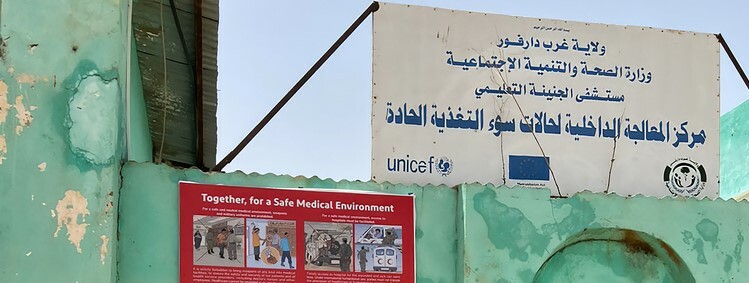In the war-ravaged state of West Darfur, Sudan, health facilities have been left in ruins, medical equipment and medicines stolen, infrastructure sabotaged, and healthcare professionals have fled. These factors have contributed to a severe decline in health services, leaving citizens without access to essential medical care.
The outbreak of conflict in April led to the shutdown of health facilities in West Darfur for two months, during which many individuals with chronic illnesses perished due to lack of treatment.
Recognizing the urgency of the situation, a community-led initiative, supported by doctors, local administration, chiefs, and elders, was launched to address healthcare challenges.
“Following the outbreak of the war on April 15, health institutions were shut down in West Darfur for two months, during which citizens were deprived of access to health services,” stated Dr. Mohamad Al-Muwaffaq Abubakr Suleiman, a specialist in Kidney and Urinary Tract Surgery, who led a community-led initiative to address the crisis.
Speaking to Radio Tamazuj on Wednesday, Abdelsalam Mustafa Saleh, the Director General of the Ministry of Health in West Darfur state, shed light on the extent of the healthcare crisis, saying, “We are currently working with 30% of the staff, and this has affected the provision of health services, in addition to the insecurity which left the door wide open for thieves to rob hospitals and health centres.” Saleh also noted that over 70% of healthcare professionals had migrated due to the war.
He further elaborated on the destruction caused by the conflict, explaining, “The extent of destruction to health institutions exceeded 40%, as equipment and medicines were stolen, and some buildings were burned down.” However, efforts by the community and volunteers helped restore El-Geneina Hospital and other healthcare centres.
Dr. Musaab Abdelhakim, the Director of El-Geneina Teaching Hospital, recounted, “The hospital is operating at 80% capacity, saying that it was completely destroyed, and medical equipment were stolen.”
He emphasized the crucial role of volunteers in providing healthcare services and noted that several departments operate 24 hours a day, including Obstetrics, Paediatrics, and Nursery.
Major diseases treated at the hospital include malaria, diarrhoea, malnutrition, and caesarean section surgeries. Abdelhakim acknowledged the support from humanitarian organizations like MSF and community initiatives while also calling on other organizations to assist in continuing healthcare services.
Hussein Kabir, a father of a young patient in the Paediatric ward, commended the hospital’s services and praised MSF for their contributions, urging the organization to expand its support to other hospital departments.
Al-Tijani Fideel, a nutrition officer and supervisor of the nutrition centre at El-Geneina Hospital, highlighted the importance of their centre in providing nutrition services to children, particularly since other health centres that offered these services had been shuttered due to the war.




